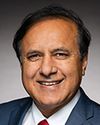Actually, I would say there was a question about those who had departed prior to their findings of inadmissibility.
When we met with the committee in June, we thought that was 10 people. It was, in fact, 13. The task force has reviewed those cases, and six have been found to be genuine; seven have been found not to be genuine.
Those people do not have an inadmissibility finding, and so there is nothing that stops them from reapplying to come to Canada. Notes have been left in the system.
In the case of the genuine students, they would be considered a de novo case. In the cases of non-genuine students, they are still assessed as de novo cases, and they probably would be subject to greater scrutiny, because of the past action, but they would be considered new cases.



